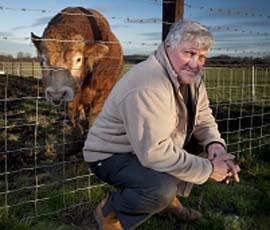Farmer ‘over the moon’ as bull tests TB negative

The farmer who challenged DEFRA over a positive TB test on his prize-winning bull has said he is over the moon after the animal proved clear of the disease in a retest.
Ken Jackson, of Forlorn Hope Farm, Walden Stubbs, South Yorkshire, took DEFRA to the High Court in April 2010 claiming veterinary workers had bungled the test.
He argued the positive result on the bull, Hallmark Boxster, was invalid because DEFRA workers had mixed test samples in the field, breaking guidelines.
DEFRA, however, refused to remove a slaughter notice on Boxster and turned down Mr Jackson’s plea to have the test conducted again, insisting the original result could not be wrong.
But after a 12-month courtroom battle, the judge ruled against DEFRA saying it had made “a policy mountain out of what was a farm molehill”.
Mr Justice McCombe ordered the department to pay £15,000 of costs and gave the go ahead for a retest to be carried out.
That test has now shown that the bull never did have the disease.
A delighted Mr Jackson told Farmers Weekly that he had punched the air when he heard the news from the Animal Health lab.
“It’s all we wanted – the right to a retest. Now it’s proved Boxster is clear of the disease we are over the moon.”
“The blood test and a skin test both proved negative.
“We kept him isolated for 18 months. He can return to the herd. It really is great news for us and our herd,” Mr Jackson said.
A spokesman for Animal Health confirmed Boxter had tested negative.
“Following the High Court decision, the Jacksons’ bull Hallmark Boxster has been subjected to the standard testing programme required where infection with bovine TB has been confirmed. He has tested negative to the required tests.
As a result all TB related restrictions on the animal will now be lifted.
“We’re confident that the blood test was conducted correctly the first time around. The test is incredibly effective, with a 97% success rate, but there’s always a very small possibility of a false result.
“The test is so accurate that if an animal tests positive we must look to remove it to stop this devastating disease spreading,” the spokesman said.
